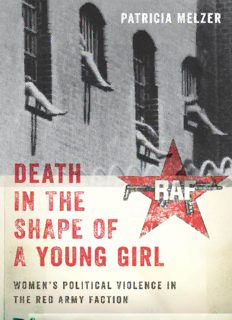
Death in the shape of a young girl : women's political violence in the Red Army Faction PDF
Preview Death in the shape of a young girl : women's political violence in the Red Army Faction
DEATH IN THE SHAPE OF A YOUNG GIRL GENDER AND POLITICAL VIOLENCE SERIES General Editor: Laura Sjoberg Muscular Nationalism: Gender, War, and Empire in India and Ireland, 1914–2004 Sikata Banerjee Female Soldiers in Sierra Leone: Sex, Security, and Post-Conflict Development Megan H. MacKenzie Death in the Shape of a Young Girl: Women’s Political Violence in the Red Army Faction Patricia Melzer PATRICIA MELZER DEATH IN THE SHAPE OF A YOUNG GIRL Women’s Political Violence in the Red Army Faction NEW YORK UNIVERSITY PRESS New York and London NEW YORK UNIVERSITY PRESS New York and London www.nyupress.org © 2015 by New York University All rights reserved Book designed and typeset by Charles B. Hames References to Internet websites (URLs) were accurate at the time of writing. Neither the author nor New York University Press is responsible for URLs that may have expired or changed since the manuscript was prepared. ISBN: 978-1-4798-6407-2 For Library of Congress Cataloging-in-Publication data, please contact the Library of Congress. New York University Press books are printed on acid-free paper, and their binding materials are chosen for strength and durability. We strive to use environmentally responsible suppliers and materials to the greatest extent possible in publishing our books. Manufactured in the United States of America 10 9 8 7 6 5 4 3 2 1 Also available as an ebook For Karl, with love This page intentionally left blank Contents Acknowledgments ix Introduction: “An Excess of Women’s Emancipation”: Gender, Political Violence, and Feminist Politics 1 1 The Other Half of the Sky: Revolutionary Violence, the RAF, and the Autonomous Women’s Movement 35 2 “Between a Rock and a Hard Place”: The “Betrayal” of Motherhood among the Women of the RAF and Movement 2nd June 73 3 “Terrorist Girls” and “Wild Furies”: Feminist Responses to Media Representations of Women Terrorists during the “German Autumn” of 1977 109 4 The Gendered Politics of Starving: (State) Power and the Body as Locus of Political Subjectivities in the RAF Hunger Strikes 153 5 “We Women Are the Better Half of Humanity Anyway”: Revolutionary Politics, Feminism, and Memory in the Writings of Female Terrorists 195 Conclusion: “Can Political Violence Be Feminist?” 231 Notes 245 References 311 Index 329 About the Author 339 vii This page intentionally left blank Acknowledgments This book has been close to ten years in the making and as with all aca- demic projects, could not have been completed without the support of various groups of people. I want to thank my family for supporting me through the process, including housing and feeding me during extended stays at the archives, beginning with my parents, Annemie and Klaus- Jürgen Melzer, who unfailingly have been there for me, all my life. I also want to thank my oldest sister, Kathrin, whose input into parts of this book has been invaluable. I cannot imagine myself having done this work without the encouragement of her and my two sisters Nanette and Temesgen and my sisters-in-spirit, Marina Walter and Natali Schirm. A special thank you to Michelle Matisons, whose friendship has been central in making me begin this journey; her radical dedication to social justice and creative thinking continues to be influential on my work. Thanks to research grants from the College of Liberal Arts at Tem- ple as well as a summer research grant and a sabbatical research year from Temple University, I was able to visit archives in Germany and the Netherlands and travel to conferences. My mentors and friends at Temple have been my intellectual and emotional “backbone” during this project. I enjoyed Kristi Brian’s friendship and grounding presence in times of transition; since her move, they are sorely missed. Rickie Sanders has been a good mentor and friend for the past ten years. Beth Bailey’s smart advice and consistent support of my endeavors are much appreciated. James Salazar has been a wonderful friend with a bagful of tricks who greatly facilitated the publication of the book. Laura Levitt has been unfailing with her backing of me and of my work, and I am grateful for her extending her support and friendship to my family. I greatly enjoyed smart conversations with Margaux Cowden about femi- nist theories of violence and appreciated her thoughtful input into my writing. I also want to thank my department chair, Louis Mangione, whose advice and support in the past two years have been central to the ix
Description: